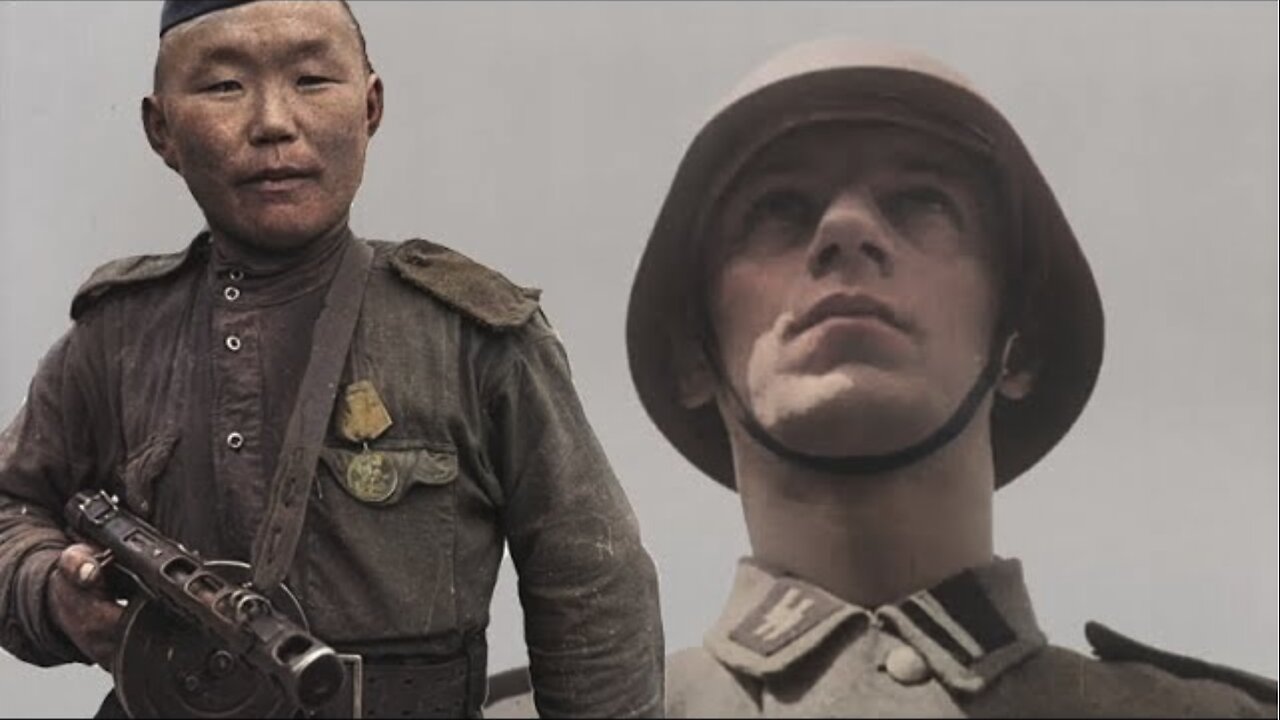Premium Only Content

2. SS Div. REICH (Mot.) vs SIBERIANS in 32nd Soviet Rifle at the MOSCOW Defense Line Oct 13/14, 1941 - № 33
🔥PREVIEW ALL YOUTUBE VIDEOS
www.Patreon.com/Military1945
Episode 266
Be sure to give this video a THUMBS UP! Best way to support the channel!
SUBSCRIBE to M1945
During the defense of Moscow in late 1941 and early 1942, Siberian soldiers played a crucial role in bolstering the Soviet defenses against the advancing German Army. As the German forces mounted a significant offensive towards Moscow, Soviet military leaders recognized the urgent need for reinforcements. They called upon units from Siberia, which had been largely shielded from the early stages of the war and were well-equipped for winter combat.
The Siberian troops were known for their rigorous training, resilience, and ability to fight in severe winter conditions. They arrived in Moscow in December 1941 and were instrumental in launching a counteroffensive against the German forces. This counteroffensive, known as the Moscow Offensive, began on December 5, 1941, and saw Soviet troops pushing back the Germans from the vicinity of Moscow.
The involvement of Siberian soldiers was significant for several reasons:
Tactical Advantage: Siberian units were adequately trained for the harsh winter climate, which the Germans were less prepared for. Their experience allowed them to utilize the weather conditions to their advantage.
Fresh Troops: By bringing in these reinforcements, the Soviets were able to inject fresh troops into the defense of the city, which was critical, as many Soviet soldiers had already endured months of intense fighting.
Counteroffensive Strategy: The strategy employed involved encircling German troops and applying pressure from multiple fronts. Siberian soldiers participated actively in these operations, contributing to the overall success of the Soviet counteroffensive.
Moral and Symbolic Impact: The arrival of the Siberian troops boosted morale among the defending forces and demonstrated the Soviet Union's ability to mobilize its vast resources in response to the German threat.
Overall, the Siberian soldiers' participation in the defense of Moscow was a key factor in halting the German advance and played a significant role in the eventual Soviet victory.
SOVIET 32nd RIFLE DIVISION
and the defense of Moscow
The Soviet 32nd Rifle Division played a role in the defense of Moscow during World War II, specifically during the critical period of the Battle of Moscow in late 1941. This battle was a significant turning point in the war, as it marked the first major defeat of the German Wehrmacht, which had advanced rapidly through Soviet territory.
The 32nd Rifle Division was part of the Red Army and was formed in the early years of the war. By the time of the defense of Moscow, the unit had been involved in various engagements as the German Army advanced toward the Soviet capital. As the Germans launched Operation Typhoon in October 1941, aiming to capture Moscow before winter set in, the Soviet forces, including the 32nd Rifle Division, were mobilized to halt this offensive.
During the defense, the 32nd Rifle Division, along with other Soviet units, was involved in heavy fighting against German forces. The division's troops faced severe conditions as they fought in the freezing temperatures of winter, with inadequate supplies and equipment. However, they were part of a larger Soviet counteroffensive, launched in December 1941, which ultimately succeeded in pushing back the German forces and securing the capital.
The defense of Moscow, including the contributions of the 32nd Rifle Division, demonstrated the resilience and determination of the Soviet military and marked the beginning of a series of Soviet offensives that would eventually turn the tide of the war against the Nazis. The tactics, strategies, and the willingness of Soviet soldiers to endure great hardships during this period laid the groundwork for future successes on the Eastern Front.
-
 35:24
35:24
Survive History
17 hours agoCould You Survive in a Cavalry Regiment During the English Civil War?
3K1 -
 28:15
28:15
Degenerate Plays
11 hours agoTwo Birds' Secret Meeting - Gotham Knights : Part 26
2.47K1 -
 12:29
12:29
Mr. Build It
5 days agoWish I Knew This Before I Started Building It
35.5K15 -
 2:03:57
2:03:57
Megyn Kelly
2 days agoNew Trump Derangement Syndrome, and How CNN Smeared a Navy Veteran, w/ Piers Morgan & Zachary Young
135K173 -
 10:05
10:05
DIY Wife
3 years agoHow We Flip Old Furniture For Profit!
70.2K58 -
 2:14:54
2:14:54
TheSaltyCracker
9 hours agoTrump Goes Gangster ReeEEeE Stream 01-26-25
146K297 -
 4:42:13
4:42:13
Due Dissidence
18 hours agoTrump Calls To "CLEAN OUT" Gaza, Swiss ARREST Pro-Palestine Journalist, MAGA's Hollywood Makeover?
66.9K91 -
 2:02:20
2:02:20
Nerdrotic
11 hours ago $19.97 earnedDECLASSIFIED: JFK, MLK UFO Immaculate Constellation Doc | Forbidden Frontier #089
88.3K17 -
 3:00:14
3:00:14
vivafrei
19 hours agoEp. 248: "Bitcoin Jesus" Begs Trump! Rekieta Gets Plea Deal! Pardons, Deportations, Bird Flu & MORE!
206K221 -
 3:44:06
3:44:06
Rising Rhino
17 hours ago $14.24 earnedWashington Commanders Vs Philadelphia Eagles: NFL NFC Championship LIVE Watch Party
97.7K4